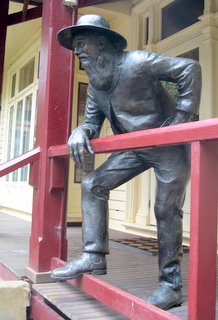
"The Man From Ironbark" is a poem by Australian bush poet Banjo Paterson. It is written in the iambic heptameter.
"Freedom on the Wallaby", Henry Lawson's well known poem, was written as a comment on the 1891 Australian shearers' strike and published by William Lane in The Worker in Brisbane, 16 May 1891.
"Saint Peter" is a well-known poem by iconic Australian writer and poet Henry Lawson. It was first published on 8 April 1893 in The Bulletin.
Up The Country is a popular poem by iconic Australian writer and poet Henry Lawson. It was first published in The Bulletin magazine on 9 July 1892, under the title Borderland, and started the Bulletin Debate, a series of poems by both Lawson and Andrew Barton "Banjo" Paterson about the true nature of life in the Australian bush.
The City Bushman is a poem by iconic Australian writer and poet Henry Lawson. It was first published in The Bulletin magazine on 6 August 1892, under the title In Answer to "Banjo", and Otherwise. It was the fourth work in the Bulletin Debate, a series of poems by both Lawson and Andrew Barton "Banjo" Paterson, and others, about the true nature of life in the Australian bush.
"Flag of the Southern Cross" is a poem written in 1887 by Australian bush poet Henry Lawson. The title refers to the Eureka Flag flown at the Eureka Rebellion in Ballarat, Victoria in 1854. It was originally published in Truth, a Sydney newspaper.
"Bell-Birds" is a poem by Australian writer Henry Kendall that was first published in The Sydney Morning Herald on 25 November 1867.
The Poets of the Tomb is a poem by Australian writer and poet Henry Lawson. It was first published in The Bulletin magazine on 8 October 1892 in reply to fellow poet Andrew Barton "Banjo" Paterson's poem, In Answer to Various Bards.
The Women of the West is a poem by Australian poet George Essex Evans. It was first published in The Argus newspaper on 7 September 1901, and later in the poet's poetry collection The Secret Key and Other Verses (1906).
Andy's Gone With Cattle is a poem by Australian writer and poet Henry Lawson. It was first published in The Australian Town & Country Journal on 13 October 1888.

The Teams is a poem by Australian writer and poet Henry Lawson. It was first published in the Australian Town and Country Journal on 21 December 1889. It was later published in the poet's poetry collection In the Days When the World Was Wide and Other Verses in 1896.
This article presents a list of the historical events and publications of Australian literature during 1957.
"The Never-Never Country" (1901) is a poem by Australian poet Henry Lawson. It is also known by the title "The Never-Never Land".
"Faces in the Street" (1888) is a poem by Australian poet Henry Lawson.
"The Song of Old Joe Swallow" (1890) is a poem by Australian poet Henry Lawson.
"Song of the Shingle Splitters" (1874) is a poem by Australian poet Henry Kendall.
"How M'Dougal Topped The Score" (1898) is a poem by Australian poet Thos. E. Spencer.
"The Fire at Ross's Farm" (1890) is a poem by Australian poet Henry Lawson.
"The Roaring Days" (1889) is a poem by Australian poet Henry Lawson.
"His Father's Mate" is a melodramatic short story by Henry Lawson. It was first published in the 22 December 1888 issue of The Bulletin, and later included in the author's short story collection, While the Billy Boils, and in many short story anthologies. It was the author's first published short story.

